新概念笔记1-70课
新概念英语第二册笔记_第70课

Lesson 70 Red for danger 危险的红色【Text】During a bullfight, a drunk suddenly wandered into the middle of the ring. The crowd began to shout, but the drunk was unaware of the danger. The bull was busy with the matador at the time, but it suddenly caught sight of the drunk who was shouting rude remarks and waving a red cap. Apparently sensitive to criticism, the bull forgot all about the matador and charged at the drunk. The crowd suddenly grew quiet. The drunk, however, seemed quite sure of himself.When the bull got close to him, he clumsily stepped aside to let it pass. The crowd broke into cheers and the drunk bowed. By this time, however, three men had come into the ring and they quickly dragged the drunk to safety. Even the bull seemed to feel sorry for him, for it looked on sympathetically until the drunk was out of the way before once more turning its attention to the matador.【课文翻译】在一次斗牛时,一个醉汉突然溜达到斗牛场中间,人们开始大叫起来,但醉汉却没有意识到危险。
新概念英语第一册NCE1第1-70课复习
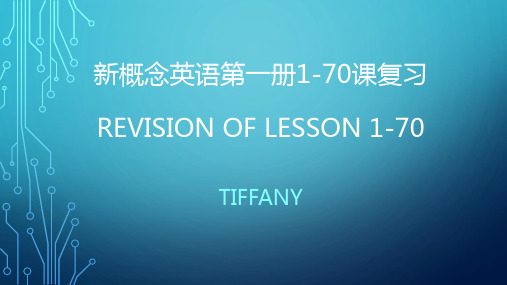
He comes from China.
• 3.What's his nationality? (What
nationality is he?) He’s Chinese.
常见国家国籍
• China • Japan • England • America • France • Italy
现在进行时
• 肯定句
• 变否定句在be动词后面加 not
We are having lunch.
We are not having lunch.
He is reading a book.
He is not reading a book.
The dog is running after a cat. The dog is not running after a cat.
• 含有be动词的句子, 将be动词变为
过去式,am, is的过去式为was, are的过去式为were
I was at the butcher’s.
You were a student a year ago.
The teacher was very beautiful ten years ago.
friends.
*变否定句在be动词后面加not He is not a teacher. The boy is not very fat. Lily and Lucy are not good
friends.
一般现在时
*变一般疑问句将be动词移到句首
He is a teacher. The boy is very fat. Lily and Lucy are good friends.
新概念英语第1册第69-70课重点语法

新概念英语第1册第69-70课重点语法新概念英语第1册第69-70课重点语法第69-70课的内容:一、重要句型或语法1、普通过去时表示过去发生的而现在已经结束的动作或状态。
本课主要学习的是There was/There were的用法,如:In 1995, there was a very big race. / There were hundreds of people there.2、介词:各种时光的表达1)in:普通后接月,份、季度和年份,如:in May, in summer, in 2022。
也会用于某些短语,如:in themorning/afternoon/evening。
2)on:普通后接详细日期或星期,表示详细哪一天。
如:on July 1st, 1921/on Saturday。
3)at:普通后接详细时刻,表示几点几分。
如:at 7o'clock/at 7:35。
二、课文主要语言点There is a car race near our town every year.1)可复习there is/are和普通现在时的用法。
2)race普通表示竞速类的竞赛。
注重区别race与match(球类运动竞赛等)。
There were hundreds of people there. hundreds of表示成百上千、数以百计,是一种概数。
假如要表达确定的数字,普通用作:基数词+hundred+名词,如:five hundred students,注重hundred 不能用复数,也不能再后接of。
My wife and I were at the race. be at the race,表示在比赛现场、观察竞赛。
Our friends Julie and Jack were there, too. Julie and Jack作为myfriends的同位语,补充说明我的伴侣叫什么名字。
(完整版)新概念英语第二册笔记_第70课

Lesson 70 Red for danger 危险的红色【Text】During a bullfight, a drunk suddenly wandered into the middle of the ring. The crowd began to shout, but the drunk was unaware of the danger. The bull was busy with the matador at the time, but it suddenly caught sight of the drunk who was shouting rude remarks and waving a red cap. Apparently sensitive to criticism, the bull forgot all about the matador and charged at the drunk. The crowd suddenly grew quiet. The drunk, however, seemed quite sure of himself.When the bull got close to him, he clumsily stepped aside to let it pass. The crowd broke into cheers and the drunk bowed. By this time, however, three men had come into the ring and they quickly dragged the drunk to safety. Even the bull seemed to feel sorry for him, for it looked on sympathetically until the drunk was out of the way before once more turning its attention to the matador.【课文翻译】在一次斗牛时,一个醉汉突然溜达到斗牛场中间,人们开始大叫起来,但醉汉却没有意识到危险。
裕兴新概念英语第二册笔记 第70课
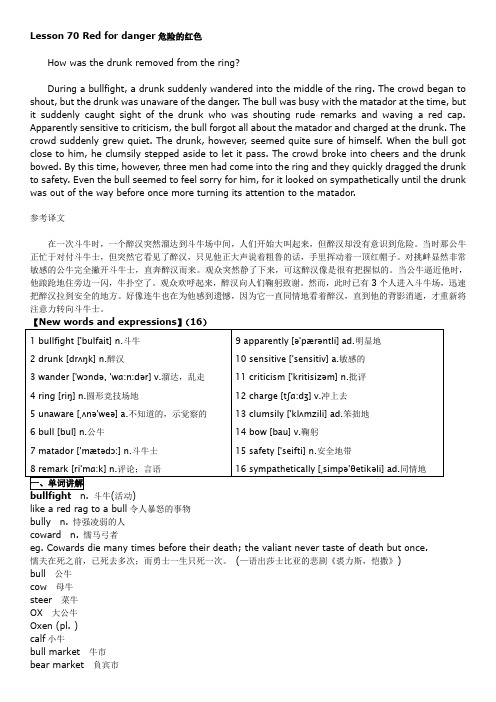
Lesson 70 Red for danger危险的红色How was the drunk removed from the ring?During a bullfight, a drunk suddenly wandered into the middle of the ring. The crowd began to shout, but the drunk was unaware of the danger. The bull was busy with the matador at the time, but it suddenly caught sight of the drunk who was shouting rude remarks and waving a red cap. Apparently sensitive to criticism, the bull forgot all about the matador and charged at the drunk. The crowd suddenly grew quiet. The drunk, however, seemed quite sure of himself. When the bull got close to him, he clumsily stepped aside to let it pass. The crowd broke into cheers and the drunk bowed. By this time, however, three men had come into the ring and they quickly dragged the drunk to safety. Even the bull seemed to feel sorry for him, for it looked on sympathetically until the drunk was out of the way before once more turning its attention to the matador.参考译文在一次斗牛时,一个醉汉突然溜达到斗牛场中间,人们开始大叫起来,但醉汉却没有意识到危险。
《新概念英语》第二册学习笔记70 69课

《新概念英语》第二册学习笔记70 69课第70课Red for danger1、...a drunk suddenly wandered into the middle of the ring.ring 这里指斗牛场,英语中不同的比赛场馆有不同的名词表述:volleyball / basketball / tennis / badminton 用courtfootball / baseball / softball 用field2、The crowd began to shout, but the drunk was unaware of the danger.unaware of 不知道什么,没有注意到什么例句:She seemed quite unaware of the other sitting around her.aware of 知道例句:If only you were aware of all the facts, you would immediately change your mind.3、The bull...suddenly caught sight of the drunk...catch sight of 猛然看见例句:I caught sight of an old friend of mine in the middle of the crowd.lose sight of 看不见什么例句:We mustn't get so bogged down by detail that we lose sight of our main objectives.4、Apparently sensitive to criticism, the bull forgot all about the matador and charged atthe drunk.sensitive to sth. 对什么敏感例句:He is not sensitive enough to his own shortcomings.5、The drunk, however, seemed quite sure of himself.sure of oneself 自信例句:Mark was so confident, so sure of himself.6、...it looked on sympathetically until the drunk was out of the way...look on 旁观例句:His parents looked on with a triumphant smile as he collected his prize.7、文中出现了大量的形容词词组:形容词+ 介词(1)...the drunk was unaware of the danger.(2) The bull was busy with the matador at the time...(3) Apparently sensitive to criticism...(4) The drunk, however, seemed quite sure of himself.(5) Even the bull seemed to feel sorry for him...第69课But not murder!1、I had been asked to drive in heavy traffic...heavy traffic 拥挤的交通heavy 形容词,有很多意思,下面简单介绍几种常见用法:(1)表示某物的重量很重例句:He dumped the heavy suitcase by the door.(2) 表示某个人的脸色阴沉例句:He had a heavy, sullen face.(3) 表示食物的量很大,或者很难消化例句:I felt so full after that heavy meal.2、The examiner must have been pleased with my performance. must + 现在完成时,表示对过去的事情进行推测pleased with 对什么感到满意,对什么感到高兴pleased 可以用在三种句型中:(1) pleased + that clause例句:She seemed very pleased that he had come.(2) pleased with sth. / sb.例句:He was pleased with my progress.(3) pleased to do sth.例句:I am so pleased to have seen you again.3、Let us suppose that a child suddenly crosses the road in frond of you.suppose 动词,假设例句:Suppose we don't say a word, and somebody else finds out about it.suppose 除了表示假设,还有另外一个意思,表示推测或者预测例句:It was quite reasonable to suppose that wanted to money.No one suppose that nuclear weapons are going to be swept away overnight.4、Though the sound could be heard clearly, it took me a long time to react.react 动词,对某事做出反应例句:Sam didn't look up or react in any way.5、本课出现了大量的被动语态,并且是以不同时态不同方式出现的:(1)I was being tested for a driving licence for the third time.此句是过去进行时的被动语态:was/were + being + 动词过去分词(2)I had been asked to drive in heavy traffic...此句是过去完成时的被动语态:had been + 动词过去分词(3)Though the sound could be heard clearly...此句是一般过去时的被动语态,并且出现了一个情态动词could,所以结构是:could + be + 动词过去分词(4)I suddenly pressed the brake pedal hard and we were both thrown forward.此句是一般过去时的被动语态:was/were + 动词过去分词。
新概念英语第二册笔记-第70课

Lesson 70 Red for danger 危险的红色【Text】During a bullfight, a drunk suddenly wandered into the middle of the ring. The crowd began to shout, but the drunk was unaware of the danger. The bull was busy with the matador at the time, but it suddenly caught sight of the drunk who was shouting rude remarks and waving a red cap. Apparently sensitive to criticism, the bull forgot all about the matador and charged at the drunk. The crowd suddenly grew quiet. The drunk, however, seemed quite sure of himself.When the bull got close to him, he clumsily stepped aside to let it pass. The crowd broke into cheers and the drunk bowed. By this time, however, three men had come into the ring and they quickly dragged the drunk to safety. Even the bull seemed to feel sorry for him, for it looked on sympathetically until the drunk was out of the way before once more turning its attention to the matador.【课文翻译】在一次斗牛时,一个醉汉突然溜达到斗牛场中间,人们开始大叫起来,但醉汉却没有意识到危险。
Red for danger危险的红色-新概念英语第二册自学导读笔记第70课

Red for danger危险的红色-新概念英语第二册自学导读笔记第70课新概念英语第二册第70课课文重难点 further notes on the text1.…the drunk was unaware of the danger.……醉汉没有意识到危险。
while she read the book, she was unaware of the noise around her.她看那本书时没有觉察到周围的噪音。
i was unaware that you were coming.我不知道你要来。
2.it suddenly caught sight of the drunk,突然它看见了醉汉。
catch sight of是个固定短语,意为"看见"、"发现":as i came out of the shop, i caught sight of dan in the crowd.当我从商店里出来时,我在人群中看到了丹。
3.sensitive to criticism,对挑衅/批评敏感。
sensitive表示"敏感的"、"神经过敏的"、"易生气的"或"介意的"等,通常与to+名词连用,也可作定语:mary is sensitive to smells.玛丽对气味很敏感。
mary has a sensitive ear.玛丽的耳朵很灵敏。
you're too sensitive.你太敏感了(太容易生气了)。
4.the drunk, however, seemed quite sure of himself.可这醉汉像是很有把握似的。
be/ feel sure of oneself 表示"有自信心":she's always so sure of herself.她总是这么自信。
新概念英语一册1-72课语法总结
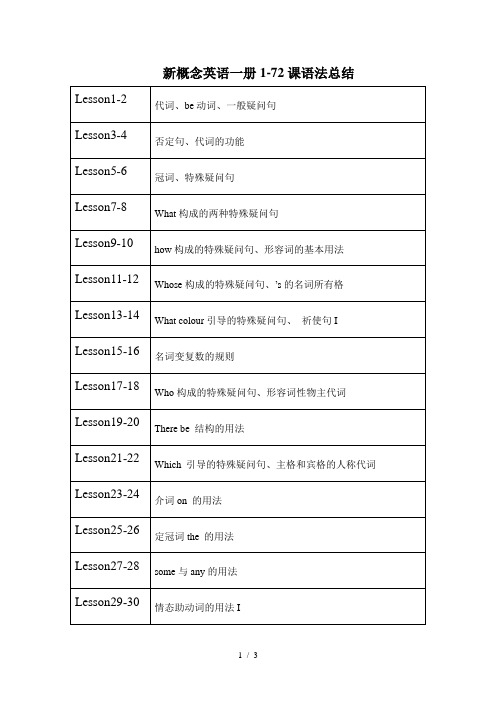
定冠词的省略
Lesson53-54
常用的不同国家的人的名词的单复数
Lesson55-56
一般现在时III
Lesson57-58
一般现在时与现在进行时的区别、时间I
Lesson59-60
have的用法I、all的用法
Lesson61-62
系动词的用法、e的用法II
Lesson63-64
介词on的用法
Lesson25-26
定冠词the的用法
Lesson27-28
some与any的用法
Lesson29-30
情态助动词的用法I
Lesson31-32
现在进行时I
Lesson33-34
现在进行时II
Lesson35-36
不及物动词构成的短语动词
Lesson37-38
一般将来时I be going to构成的一般将来时
情态动词用法III don’t和mustn’t的用法区别
Lesson65-66
反身代词
Lesson67-68
一般过去时I、名词所有格的特殊用法
Lesson69-70
一般过去时II、介词in \ on\ at后面跟时间名词的用法
Lesson71-72
常与一般过去时连用的时间状语
Lesson13-14
What colour引导的特殊疑问句、祈使句I
Lesson15-16
名词变复数的规则
Lesson17-18
Who构成的特殊疑问句、形容词性物主代词
Lesson19-20
There be结构的用法
Lesson21-22
Which引导的特殊疑问句、主格和宾格的人称代词
新概念一Lesson1-72重点

新概念一Lesson1-72重点总结Lesson 1★人称代词主格:用在句首,作主语宾格:在动词、介词之后形容词性的物主代词:不能单独使用名词性物主代词:只能单独使用★be动词:am、is、areI amshe/ he/ it isyou/ we/ they are[语法]含有be动词的陈述句、否定句和一般疑问句含有be动词的任何句子,否定句就是在be动词后面加not;如果变一般疑问句,就把be动词提前到句子的前面。
Lesson 3★地点副词:(在英语中,时间副词、地点副词的前面不能加介词)here 这里there 那儿home 家(副词,名词)abroad 国外downstairs 楼底下upstairs 楼上downtown 市中心[语法]祈使句:祈使句:主语通常不直接表示出来,其谓语动词用原型,也叫无主句。
表示命令、请求、建议、叮嘱等。
祈使句真正的主语是你,但省略了。
My umbrella and my coat please. 省略了动词和间接宾语的祈使句。
Keep off the grass! 请勿践踏草地!Help yourself! 请自己动手!某些祈使动词可以后跟and和另一个祈使动词,而不是后跟带to的动词不定式结构。
Come and see this goldfish.Go and buy yourself a new pair of shoes.去给自己买双新鞋吧。
Wait and see. 等着瞧吧。
倒装句:here is 是简单的倒装句,be 动词放在 here 的后面,这个句式就可以成为简单的倒装句式。
My ticket is here. 我的票在这。
Here is my ticket. / Here's my ticket.Lesson 5[语法]冠词:冠词数量上表示“一个”。
冠词一共有三个,分为不定冠词和定冠词。
1、a, an 是不定冠词:可数名词单数前面必须要用不定冠词a 用在以辅音音素开头的名词前面,an 用于以元音音素(元音发音的单词)开头的名词前面a pen an apple an umbrella an egg an hour a university2、the 是定冠词,表示特指,有两种发音:[❆☜]、[❆♓],以元音发音开头的单词前面读[❆♓]。
新概念英语第一册1-72课语法点总结

新概念英语第一册1-72课语法点总结1.物主代词2.人称代词3.Be动词Be动词在一般现在时的三个变形:am, is, areBe动词在一般过去时的两个变形:was,were●注意:Be动词要根据主语的变化而变化。
4.一般疑问句定义:一般疑问句是指可以用Yes或者No回答的句子。
肯定句变为一般疑问句:若一个肯定句中存在Be动词am,is, are,则直接将Be动词提前,结尾加问号。
若一个肯定句中存在情态动词,则直接将情态动词提前,结尾加问号。
若一个肯定句中存在实义动词,则直接在句首加助动词do/does/did,实义动词变原形,结尾加问号。
注意:一般疑问句一般读为升调。
例:Are you a teacher?你是一名老师吗?肯定回答:Yes,I am. 否定回答:No, I am not。
Do you like English? 你喜欢英语吗?肯定回答:Yes, I do。
否定回答:No, I don’t.5.特殊疑问句定义:不能用Yes或者No回答的句子。
构成:特殊疑问词+ 一般疑问句特殊疑问词:what(什么),when(何时),where(何地),who (谁), whom(谁宾格), whose(谁的),which(哪个), why(为什么), how(怎么样)口诀:非常八加一6.不定冠词a/an若单词是以“a, e, i,o”四个元音开头,其前面选用“an”;若单词是以元音字母“u”开头,视情况而定。
若其发音与“umbrella"中的“u"一致,则前面加“an”;若其发音与“university”中的“u"一致(即发字母本身音时),前面加“a”。
若单词是以辅音字母开头,一般前面用a。
特殊:an hour 一个小时;an honest boy 一个诚实的男孩若一个字母单独出现时,分如下情况:加an的字母:a,e, i, o(元音); x,r, s,l,n,f,m, h (辅音;口诀为“学而思送来那份美好”)例:There is an “m” in the word “umbrella”。
新概念第一册每一课重点总结
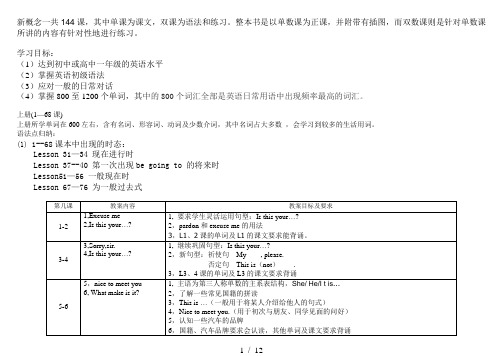
新概念一共144课,其中单课为课文,双课为语法和练习。
整本书是以单数课为正课,并附带有插图,而双数课则是针对单数课所讲的内容有针对性地进行练习。
学习目标:
(1)达到初中或高中一年级的英语水平
(2)掌握英语初级语法
(3)应对一般的日常对话
(4)掌握800至1200个单词,其中的800个词汇全部是英语日常用语中出现频率最高的词汇。
上册(1—68课)
上册所学单词在600左右,含有名词、形容词、动词及少数介词,其中名词占大多数,会学习到较多的生活用词。
语法点归纳:
(1) 1--68课本中出现的时态:
Lesson 31—34 现在进行时
Lesson 37--40 第一次出现be going to 的将来时
Lesson51—56 一般现在时
Lesson 67—76 为一般过去式
中册(69—106课),大约有300单词,包含名词、动词、形容词、副词、介词,其中所学的动词和副词会有所增加。
课文中出现的时态有:Lesson 67—76 为一般过去式Lesson 83—90 为现在完成时Lesson 91—96 为一般将来时
下册(107—144课),大约有300个单词语法点归纳:
1、L107-108形容词的比较级,最高级
2、L117-118时间状语从句和过去进行时
3、L121-122定语从句
4、L119-120 过去完成时
5、L139-140宾语从句
6、L141-144被动语态。
新概念第一册L1-72 短语总结 上

新概念第一册短语总结上(1-72课)Lesson 1 – 101.Excuse me打扰了2.This is your …这是你的…3.Is this your…?这是你的...吗?4.This is not my…这不是我的…5.What is this?.这是什么?6.Thank you very much非常感谢7.Here is my …这里是我的8.There那里9.Son and daughter儿子和女儿10.Umbrella and ticket伞/票11.Number five第五号12.Shirt and skirt衬衣/短裙13.Teacher and student教师/学生14.Good morning早上好15.In the morning在早上16.A new student一个新学生17.He is German他是德国人18.He is a German teacher他是一德国教师1.Mr. – Mrs. – Miss先生/夫人/小姐2.Nice to meet you见到你很高兴3.What make is it?它是什么牌子的车?1.What nationality are you?你的国籍是什么?2.You are…你是—3.You are not…你不是--4.Are you….?你是—吗?5.Yes, I am – No, I am not.是,我是/不,我不是1.What is your name?你名字是什么?1.My name is…= My name‘s…我名字是---1.An engineer and an mechanic一名工程师/机械师1. A keyboard operator键盘操作人员2.Policeman and policewoman男警察/ 女警察1. A doctor and a nurse医生/护士2.Hair and hairdresser头发/理发师3.Air hostess空中小姐4. A taxi driver出租车司机5.Postman and milkman邮递员/送牛奶人1.How are you?你身体好吗?2.I am fine我很好3.How is Tom?汤姆身体好吗?4.He is well.他很好/形容词5.Day and today天/今天6.Look at me…看我。
新概念1-72课知识点
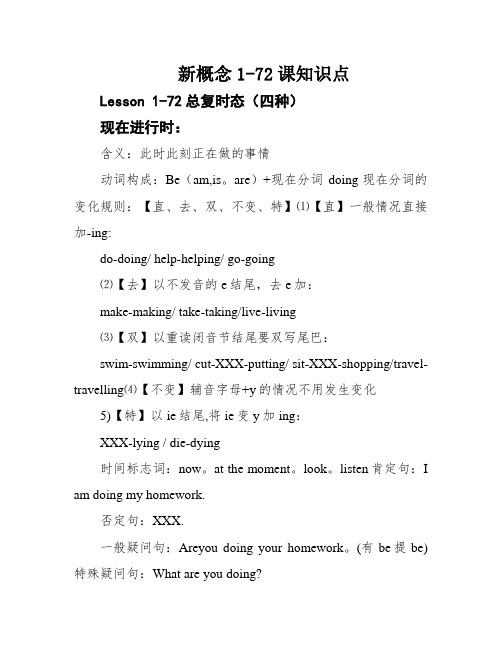
新概念1-72课知识点Lesson 1-72总复时态(四种)现在进行时:含义:此时此刻正在做的事情动词构成:Be(am,is。
are)+现在分词doing现在分词的变化规则:【直、去、双、不变、特】⑴【直】一般情况直接加-ing:do-doing/ help-helping/ go-going⑵【去】以不发音的e结尾,去e加:make-making/ take-taking/live-living⑶【双】以重读闭音节结尾要双写尾巴:swim-swimming/ cut-XXX-putting/ sit-XXX-shopping/travel-travelling⑷【不变】辅音字母+y的情况不用发生变化5)【特】以ie结尾,将ie变y加ing:XXX-lying / die-dying时间标志词:now。
at the moment。
look。
listen肯定句:I am doing my homework.否定句:XXX.一般疑问句:Areyou doing your homework。
(有be提be)特殊疑问句:What are you doing?普通未来时含义:表示准备去,将要去干….动词构成:Be(am,is。
are)going to do sth.时间标志词:tomorrow肯定句:I am going to paint the bookcase.否认句:XXX.普通疑问句:Areyou going to paint the bookcase。
(有be提be)非凡疑问句:Whatare you going to do?语法:一般现在时含义:描述某种状态、规律性或客观事实。
例句:1.I go to school every day。
(普通性)2.Peter usually brushes his teeth three times a day.(规律性)⒊The sun rises in the east and sets in the west.(客观事实)动词:不变→主语非三单如:I read XXX.变化→主语为三单形式如:He reads XXX.标志词:1)频率副词:all the time。
(完整版)新概念第一册lesson1-72重要句型知识点及语法点
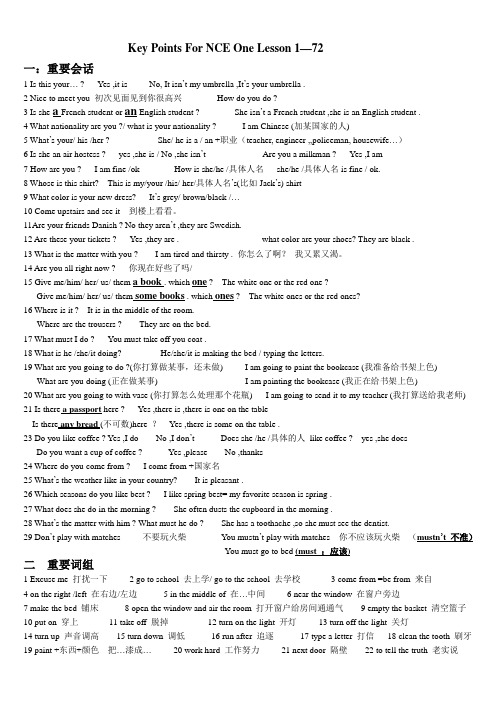
Key Points For NCE One Lesson 1—72一:重要会话1 Is this your… ? Yes ,it is No, It isn’t my umbrella ,It’s your umbrella .2 Nice to meet you 初次见面见到你很高兴How do you do ?3 Is she a French student or an English student ? She isn’t a French student ,she is an English student .4 What nationality are you ?/ what is your nationality ? I am Chinese (加某国家的人)5 What’s your/ his /her ? She/ he is a / an +职业(teacher, engineer ,,policeman, housewife…)6 Is she an air hostess ? yes ,she is / No ,she isn’t Are you a milkman ? Yes ,I am7 How are you ? I am fine /ok How is she/he /具体人名she/he /具体人名is fine / ok.8 Whose is this shirt? This is my/your /his/ her/具体人名’s(比如Jack’s) shirt9 What color is your new dress? It’s grey/ brown/black /…10 Come upstairs and see it 到楼上看看。
11Are your friends Danish ? No they aren’t ,they are Swedish.12 Are these your tickets ? Yes ,they are . what color are your shoes? They are black .13 What is the matter with you ? I am tired and thirsty . 你怎么了啊?我又累又渴。
新概念一1-72课总结

一、一到二十课学习基本的语言常识,比如说见面怎么打招呼,怎么介绍他人,问颜色等等。
重点内容包括:1、这位是谁谁。
This is……比如说This is Liming. This is my father. This is my teacher,Mr. Li.2、介绍完之后要礼貌性地说Nice to meet (see)you.或者How do you do?3、问国籍或者你是哪国人可以有三种表达方式:what nationality are you?I am Chinese.Where are you from?回答方式也分三种I am from China.Where do you come from?I come from China.4、问对方的工作。
新概念的表达方法为:what is your job?小学课本的表达方法为:what do you do?(注意不是how do you do?)回答的方式为:I am a student.My father is a worker.My mother is a nurse.She is a hairdresser.等等。
照实际情况回答。
5、问别人身体怎样?How are you?如果是第三人称单数,则要用How is……?比如说新概念第九课里面的How is Emma? How is Tony?回答的方式可以为:I am fine,thank you.对第三人称的回答则为He is fine,thank you.或者She is fine, thank you. 注意这里面的fine 还可以换成well,比如说I am well,thank you. 或者I am very well,thank you。
6、’s的用法,’s在小学阶段,基本上是三个意思:(1)is的缩写,比如说He is a student.还可以写为He’s a student.(2)us(我们)的缩写,比如说Let’s go home=L et us go home.(三)****的。
新概念英语第一册1-72学习笔记要点(DOC)

Lessons 1-2课文详注Further notes on the text1.Excuse me 对不起。
这是常用于表示道歉的客套话,相当于汉语中的“劳驾”、“对不起”。
当我们要引起别人的注意、要打搅别人或打断别人的话时,通常都可使用这一表达方式。
在课文中,男士为了吸引女士的注意而使用了这句客套话。
它也可用在下列场合:向陌生人问路,借用他人的电话,从别人身边挤过,在宴席或会议中途要离开一会儿等等。
2. Yes?什么事?课文中的Yes ?应用升调朗读,意为:“什么事?” Yes?以升调表示某种不肯定或询问之意,也含有请对方说下去的意思。
3. Pardon ?对不起,请再说一遍。
当我们没听清或没理解对方的话并希望对方能重复一遍时,就可以使用这一表达方式。
较为正式的说法是:I beg your pardon.I beg your pardon?Pardon me.它们在汉语中的意思相当于“对不起,请再说一遍” 或者“对不起,请再说一遍好吗?”4. Thank you very much .非常感谢!这是一句表示感谢的用语,意为“非常感谢(你)”。
请看下列类似的表达式,并注意其语气上的差异:Thank you.谢谢(你)。
Thanks!谢谢!5. 数字1〜10的英文写法1—one 2 —two3—three 4 —four5 —fiveevening dress晚礼服语法 Grammar in use 一般疑问句一般疑问句根据其结构又分为若干种。
通过主谓倒装可将带有 be 的陈述句变为一般疑 问句。
即将 be 的适当形式移到主语之前,如:陈述句: This is your watch. 这是你的手表。
疑问句: Is this your watch? 这是你的手表吗?(可参见Lessons 15〜16语法部分有关be 的一般现在时形式的说明。
) 词汇学习 Word study1. coat n.上衣,外套:Is this your coat?这是你的外套吗?coat and skirt< 英> (上衣、裙子匹配的)西式女套装 2. dressn.( 1 )连衣裙;套裙:Is this your dress?这是你的连衣裙吗?6— six 7 — seven 8— eight 9 — nine10 — ten( 2 )服装;衣服:casual dress 便服evening dress 晚礼服Lessons3-41.My coat and my umbrella please. 请把我的大衣和伞拿给我。
- 1、下载文档前请自行甄别文档内容的完整性,平台不提供额外的编辑、内容补充、找答案等附加服务。
- 2、"仅部分预览"的文档,不可在线预览部分如存在完整性等问题,可反馈申请退款(可完整预览的文档不适用该条件!)。
- 3、如文档侵犯您的权益,请联系客服反馈,我们会尽快为您处理(人工客服工作时间:9:00-18:30)。
1-2课没听清对方,请再说一遍。
(3种)谢谢(5种)不客气(7种)3-4课一张到某地的票。
(公式)这有一张到北京的票。
Number + ()五号五号Sir + Mr + 一套5-6课What make +主语+小汽车什么牌子?她是沃尔沃。
What 的总结(6种)第一次见面再次见面(正式)你好也:用在()句中,位于()也不:用在()句中,位于()7-8课问工作:可数不可数你是做什么工作的?三种公式:三种句子:你是哪国人?两种公式:两种句子:你来自于哪?两种公式:两种句子:9-10课胖的薄的高的长的瘦的厚的矮的短的老的旧的温暖的脏的年轻的新的凉爽的干净的热的漂亮的好的快的冷的丑陋的坏的慢的忙的重的满的懒惰的空闲的轻的空的勤奋的大的远的虚弱的黑的小的近的强壮的白的高的穷的早的贵的低的富的晚的便宜的高兴的伤心的11-12课对应词:father--- brother--- his---Peraps :Blue:公式:Whose +=名词所有格:有生命的用:无生命的用:1.2.3.4.5.13-14课Come的短语:地点副词:(5个)进来出来和某人一起来过来、加油地点副词不与()连用过来过来上楼/下楼过来回家上楼过来下楼去那The same +名词例:相同的颜色Different +可名复例:不同的颜色Look!强调,引起别人注意。
翻译成:()例:看,他在这呢!Look= = = =小事情、小案件小事一桩、小菜一碟15-16课丹麦丹麦人挪威挪威人俄罗斯俄罗斯人荷兰荷兰人我是丹麦人,我来自丹麦。
你的朋友是游客吗?朋友(3种)友谊名词变复数:Box watch actressTomato potato hero negroCherry strawberry country city17-18课来见见……例:来见见我们的雇员。
他们是做什么工作的?(3种)他们是工人。
名词变复数:例:a 变e例:oo 变ee集合名词无复数:(2个)单复数同形词:(4个)不规则的:(3个)What colour is the dress ?是红色的。
(回答有2种)区别:what is he?Who is he?表示国家的()表示工作种类的()19-20课你怎么了?(2种)孩子们怎么了?(一种表达)(两种表达)汤姆怎么了?(四种表达)又渴又累我们又渴又累。
坐下女医生(复数)坐这鸟巢(复数)坐那卖冰激凌的人(复数)有man woman 组合的短语,全都变()剩下只变()。
These shoes are big。
=Are they hot or cold ?(回答)21-22课既是可数名词又是不可数名词(默写)One()哪本书?这本书。
给一个物品用:Give +就是给你用:23-24课Give me some --------,please。
Which -----------?These---------?No not those . The ones + ( ).Would you like some ( )?你要一些水吗?答语:辨别it 与oneIt ()我喜欢这辆车我想要买这辆车。
One ()我喜欢这辆车。
我想要买这辆车。
冠词:a / anThe在桌旁在吃饭,在进餐在床上卧床(躺在床上)19-24课好,行,可以:Are you all righe =怎么了?Look at sb. He / she is + 形。
例:看看我。
看看那个女人。
她很漂亮。
形容词作:翻译:Little SmallLarge ()Big ()Thing ()Matter ()43-44课找到(结果)看听寻找(动作)看听读书(读)读书(看)我在找笔,但没找到。
Tea是()名词花茶红茶绿茶喝茶Shall IMay I + 回答:Can I我能沏茶吗?(2种)回答不用;(),用()我可以在花园里喝茶吗?沏茶整理床铺堆雪人做纸模型做书架计划煮咖啡桌子前面有个女孩。
黑板前面有把椅子。
教室前面有把椅子。
女孩在哪?在那边/ 那儿(副词)快点!壶开了。
在壶里的水开了。
(完整形式)就在那呢!(倒装句)Can 的音标:疑问句否定句肯定句45-46课情态动词:中文翻译过去式Can:Must :转化:May:你不必擦玻璃。
(2种)禁止吸烟。
(2种)我可以进来吗?等一会过来一会/ 下要求某人做某事(公式)妈妈让我写作业爸爸让我等一会要求某人做某事(否定形式)我的妈妈不让我写作业。
怎么了?(口语)隔壁隔壁的他在隔壁他是我隔壁的邻居。
看不清/ 读不出来47-48课非单三+ + ()单三+ + ()LikeWant我相见你。
我喜欢唱歌。
妈妈想让我上楼。
打印某物给某人Read sth. Lettle book newspaper to sb.= 读信/ 书/ 报纸给某人Paint / color / lift +试穿某物脱下某物取出某物跳下在早晨在今天穿上黑咖啡我喜欢把糖放到咖啡里站在一排站在排里喝茶就是和这种茶一般现在时:含义:结构:公式:标志词:现在进行时:含义:结构:公式:标志词:一般将来时:含义:结构:公式:标志词:61-62课感观动词+ ()听起来:闻起来:感觉:看起来:Must是()动词+ ()打电话(3种)给某人打电话。
公式你现在必须给医生打电话。
电话号码你的电话号码是多少?电话亭电话簿记得某事记得做某事你还记得医生的电话号码吗?走时记得关灯。
对某人而言好消息。
公式一条新闻张开嘴给我看看你的舌头。
躺在床上:Stay in bed =63-64课Good / weill的比较级最高级Much修饰()当然(3种)起床:醒:仍,还yet:常用语()你不能吃油腻的食物。
清淡的食物在卧床两天发烧(2种)保持:keep + +玩火柴在图书馆交谈探出探出窗户打破花瓶制造噪音必须做某事:禁止做某事:同义句的公式:(2种)Mustnot:donot:Every:强调Each:强调每个学生学生们中的每一个65-66课门钥匙前门钥匙问题答案喜欢、享受做某事公式:见朋友到家早/ 晚在家到家(3个)几点了?It is + 时间倒序表达方式:你的生日是什么时候?是6月7日生日用()词15分钟(2种)30分钟(2种)反身代词:我去商店我自己去商店玩的高兴=61-66课复习Stay in bed for + ()走到某地跟某人说话玩的开心/愉快(5种)喝些水多喝水歇一会/休息一下量体温so + ()Because 因为引导()I am fun =都:两者三者每个:两者三者另一个:两者三者61-66课短语1.躺在床上 2.他怎么啦?3.他觉得不舒服4.他看上去不舒服5.我们的去请医生6你还记得医生的电话号码吗?7把嘴张开8让我看看你的舌头9重感冒10因此他必须卧床一周11好消息12头痛13吃一片阿司匹林14牙痛15看牙医16发烧17上床睡觉18麻疹19耳痛20胃痛21吃药22流行性感冒23腮腺炎24上楼吧25看上去很好26你现在好些了27但你还不应该起床28你必须在卧床两天29这孩子还不能上学30不能吃油腻的食物31他还发烧吗32他还必须卧床两天33他每天可以起来两个小时34但您必须保持房间温暖35他也得了重感冒36吃一些阿司匹林37玩火柴38在图书馆交谈39探出窗户40制造噪音41打破花瓶42今晚你打算干什么,吉尔?43我打算去看几个朋友,爸爸。
44你不准回家太晚45你必须在10点半到家46这么早我到不了家47我能带上前门的钥匙吗?48 18岁了49把钥匙给她吧50他在哪个是早早回家的51你不能超过11点1刻回家52好好玩吧53我们总是玩得很开心的67-68课在肉店在面包店在理发店在杂货店在蔬菜水果批发零售店在礼拜在教堂在学校在上学在办公室/ 在乳品店我在肉店缺课、缺席、没上学她昨天没上学。
你必须保持房间温暖。
你们身体都好吗?(2种)度过度假Sb。
Spend 时间/ 金钱+花费时间/金钱+我花了2元钱买钢笔我花了2歌小时学习星期一你在哪里?你去过肉店了吗?今天星期几?星期一你在学校吗?一般过去时含义:时间状语:动词过去式变化规:否定疑问句含义:69-70课Race 指game 指汽车/ 赛马比赛在比赛中(选手参加)在赛场上(观众观看)Crowd (v.)(n.)在人群中你能看见我在人群中。
Finish (n.)(v.)比赛结尾时激动人心的。
我上周读完这本书在(某人)去某地的路上公式在上学的路上,我是一只小猫。
在(某人)去回家的路上公式在我回家的路上,我发现可怜的小狗。
数以百计(成百上千)许许多多的人都去了赛场。
数以千计(成千上万)明确数字:两百Get carry write join go Can is / are do / does see stand Spend keep在城镇在乡下在城市。
